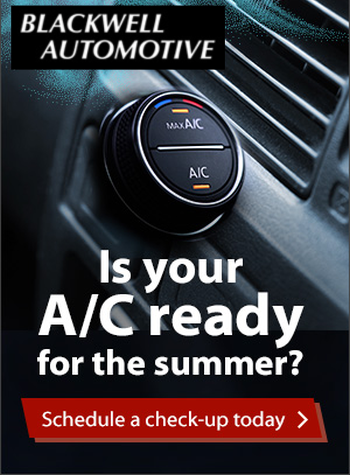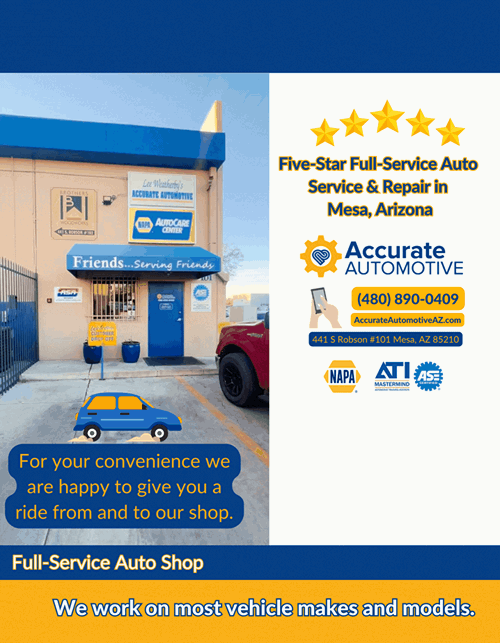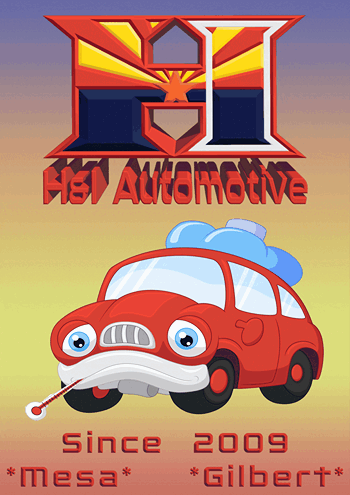

Welcome to Bumper to Bumper Radio!
Drive in anxious and cruise out confident with the best automotive information for your vehicle! Tune in to KTAR News 92.3 every Saturday from 11 a.m. to noon as Matt Allen helps listeners with their car problems. The show call in number is 602-277-5827.
Latest News From Bumper to Bumper Radio

WASHINGTON, D.C. (Sept. 26, 2018) – More and more, drivers are recognizing the value in having vehicles with advanced driver assistance systems (ADAS) like blind spot monitoring systems, forward collision warning and lane keeping assist. However, while many of these technologies are rapidly being offered as standard, many drivers are unaware of the safety limitations of ADAS in their vehicles, according to new research from the AAA Foundation for Traffic Safety. For example, researchers found that nearly 80 percent of drivers with blind spot monitoring systems were unaware of limitations or incorrectly believed the system could accurately detect vehicles passing at very high speeds or bicycles and pedestrians. In reality, the technology can only detect when a vehicle is traveling in a driver’s blind spot and many systems do not reliably detect pedestrians or cyclists. Lack of understanding or confusion about the proper function of ADAS technologies can lead to misuse and overreliance on the systems, which could result in a deadly crash.
“When properly utilized, ADAS technologies have the potential to prevent 40 percent of all vehicle crashes and nearly 30 percent of traffic deaths. However, driver understanding and proper use is crucial in reaping the full safety benefits of these systems,” said Dr. David Yang, executive director of the AAA Foundation for Traffic Safety. “Findings from this new research show that there is still a lot of work to be done in educating drivers about proper use of ADAS technologies and their limitations.”
In 2016, more than 37,400 people were killed in traffic crashes- a five percent increase from 2015. “With ADAS technologies offering proven safety benefits when properly used, it is important that automakers and others play a greater role in educating motorists about the technology available in the vehicles they purchase,” said Jake Nelson, AAA director of traffic safety advocacy and research. “AAA also urges drivers to take charge of learning their vehicle technology’s functions and limitations in order to improve safety on the road.”
The AAA Foundation for Traffic Safety commissioned researchers from the University of Iowa to survey drivers who recently purchased a 2016 or 2017 model-year vehicle with ADAS technologies. Researchers evaluated drivers’ opinions, awareness and understanding of these technologies and found that most did not know or understand the limitations of the systems:

Stelvio Quadrifoglio continues to highlight Alfa Romeo's performance expertise with best-in-class 505 horsepower and segment-leading V-6 torque, powering it from 0-60 mph in 3.6 seconds with a top speed of 176 mph
Stelvio Quadrifoglio lapped Nürburgring in record 7 minutes 51.7 seconds, the fastest time ever posted by a production SUV, making it the fastest production SUV in the world.
The Alfa Romeo Stelvio Quadrifoglio was named Performance SUV of the Year by the Automotive Video Association (AVA) at their second annual Automotive Video Awards competition.
To win its title, the Stelvio Quadrifoglio beat out vehicles such as the Mercedes-Benz AMG GLC 63 and the BMW X3 M40i. In addition to naming the Stelvio Quadrifoglio as its Performance SUV of the Year, AVA judges crowned the McLaren 720S as their Performance Car of the Year.
The two winners were chosen from among five finalists in each category (Performance Car and Performance SUV). All vehicles were put through a series of tests and then rated by AVA judges.
"This year's contenders were the best vehicle lineup we've had yet," said Nik Miles, president of OurAutoExpert.com. "Although the battle was fought hard, only two winners could come out on top. Voting was down to the wire for every single contender in each performance category. Ultimately, only two remained from all judge's entries."
RICHMOND, Va., Sept. 18, 2018 -- Less than half of Americans (43 percent) are interested in utilizing self-driving cars, down from 53 percent last year, according to the fourth annual Sharing Economy Index* released by Allianz Global Assistance. The lack of interest is primarily attributed to safety concerns (71 percent in 2018, compared to 65 percent in 2017), while other reasons include cost/budget, lack of familiarity and bad publicity. Recent high-profile crashes involving self-driving cars have dampened America's confidence and excitement over auto-piloted vehicles. In March, two self-driving vehicles were involved in fatal accidents.
Even more indicative of Americans' sentiment on self-driving vehicles, only 52 percent of Americans (down 12 points from 2017) say they are confident that the technology will develop safely enough to consider trading their conventional vehicles for self-driving ones.
Companies continue to invest billions of dollars into autonomous vehicle technology, despite the recent fatal crashes. Supporting these findings by Ipsos and Allianz Global Assistance is a Pew Research Center survey which found that 39 percent said they were not sure whether the vehicles would make roads safer or more dangerous, and 87 percent favored requiring that a human always be behind the wheel to take control if something goes awry.
"Based on consumer perceptions, our survey reveals an uncertain future for self-driving cars," says Daniel Durazo, director of communications, Allianz Global Assistance USA. "Many Americans are far from being convinced that self-driving cars can be operated safely on our streets. As our Future of Travel survey last year indicated, more travelers would feel safer on a rocket to space than being a passenger in a self-driving vehicle." View the Future of Travel survey results here.

While Hurricane Florence battered the Carolinas over the weekend with life-threating storm-surge, rain and flooding, it has had little to no impact on gas prices, with the national average, holding steady at $2.85 on the week.
Gas prices have not seen much movement because unlike the Gulf Coast, which is home to dozens of refineries, the Carolinas house only pipelines and terminals. This means U.S. crude processing is not impacted and therefore neither are gas prices nationally.
Prior to Florence’s arrival, the Energy Information Administration (EIA) reported the Lower Atlantic Region’s total gasoline stocks — which includes West Virginia, Virginia, North Carolina, South Carolina, Georgia and Florida — measured at 27.9 million bbl. That is 10 percent higher than the 5-year average for this time of year.
“Gasoline stocks in the hurricane-impacted area are healthy, but delivery of gasoline will be an impediment to meeting demand in coastal areas this week,” said Jeanette Casselano, AAA spokesperson. “As power is restored, water recedes and roads open-up, we will have a better idea of how quickly fuel deliveries can be made to gas stations in the area. And while fuel availability at stations is a concern, AAA expects station outages to be short-lived.”
According to the Department of Energy, states are working closely with industry to expedite resupply shipments to impacted areas. AAA will continue to monitor hurricane recovery efforts and fuel resupply.
The nation’s top 10 least expensive markets are: Alabama ($2.52), Mississippi ($2.54), Arkansas ($2.57), Louisiana ($2.58), Tennessee ($2.59), South Carolina ($2.60), Missouri ($2.60), Texas ($2.60), Virginia ($2.62) and Oklahoma ($2.64).
The nation’s top 10 largest monthly changes are: Colorado (+10 cents), Indiana (-6 cents), Delaware (+6 cents), Florida (-5 cents), South Carolina (+5 cents), Louisiana (-4 cents), Alaska (-4 cents), Utah (-4 cents), Iowa (+4 cents) and California (+4 cents).

EV owners can now make the 500 mile journey from Boston to Washington D.C. with ease as a series of EVgo Fast Charging stations, known as the 'I-95 Fast Charging ARC' is now open.
The ARC consists of nine EVgo Fast Charging stations equipped with 52 fast chargers in total, each with two charging connector options.
Most of the fast charging stations are located within close proximity to I-95 providing convenient access
These sites will be among the largest public fast charging stations* available to the public
NEW YORK, Sept. 6, 2018 -- Nissan and EVgo have completed their plan to connect the cities of Boston and Washington D.C. with a series of nine electric vehicle fast charging stations. The completion of the Northeast fast charging corridor provides a comprehensive charging infrastructure, giving electric vehicle (EV) owners peace of mind and convenience when travelling the 500 miles between the two cities.
Each fast charging station can charge up to four or more EVs simultaneously at a power output of 50kW. The stations have also been designed and constructed to adapt to future advances in EV technology, including pre-wiring for higher charging outputs to allow easy upgrading to 150kW fast chargers.
"We're excited to continue pioneering the development of electric vehicle infrastructure with the opening of our second charging 'corridor' project in the U.S.," said Brian Maragno, director, EV sales and marketing, Nissan North America, Inc. "This charging route along one of the most heavily populated areas of the country further demonstrates our commitment to the mass implementation and future development of easily accessible EV technology and will foster EV travel up and down the Northeastern coast of the United States."
"EVgo and Nissan's I-95 Fast Charging ARC is designed to make fast charging easy and convenient for EV drivers from Boston to Washington D.C.," said Cathy Zoi, EVgo CEO. "Because we own our fast charging stations, EVgo drivers can rely on us to offer exceptional service from coast to coast. We applaud Nissan's historic leadership in infrastructure investment in partnership with EVgo, affording drivers the opportunity to rely on the I95 Fast Charging ARC today."
Bumper Audio Clip of the Week

|
Bumper to Bumper host Matt Allen's shoutout to Shady Rays Sunglasses! Use Promo Code: BUMPER for 30% OFF! |


















